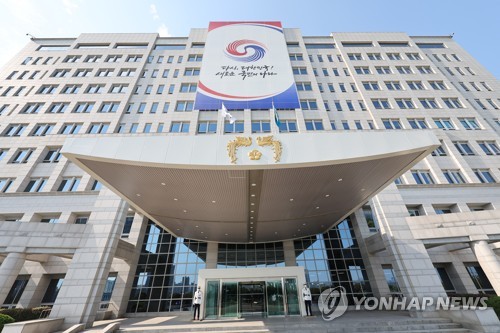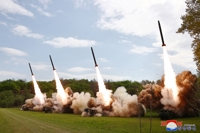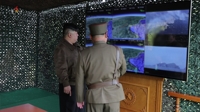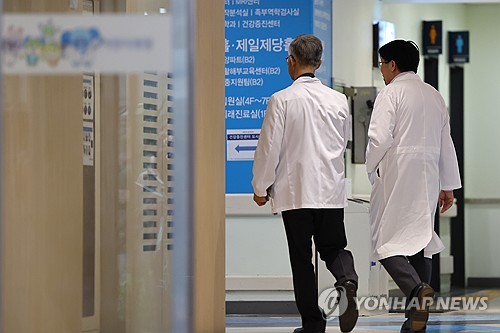(EDITORIAL from Korea Times on Nov. 26)
Additional rate hike
It's critical to check inflation, household debt
The Bank of Korea (BOK) raised its key policy rate by 0.25 percentage points to 1 percent Thursday, as part of its efforts to tame inflation and reduce household debt. The hike came three months after the central bank ramped the rate up by a quarter point. This means that the low interest rate era is coming to an end as additional rate hikes are expected next year.
The rate increase is a step in the right direction, as it reflects the BOK's determination to bring inflationary pressure under control. Consumer prices surged 3.2 percent last month from a year earlier, after staying at the 2-percent level for the sixth straight month in September. The figure was the highest since January 2012. Producer prices also jumped by 8.9 percent year-on-year last month, marking the biggest increase since October 2008.
One of major concerns is that the BOK will not meet its annual inflation target of 2 percent this year. The bank revised up the target to 2.3 percent, driven by higher prices for crude oil and raw materials. A supply chains bottleneck and rising production costs for major goods have also caused more inflationary pressure. Against this backdrop, it appears impossible to rein in inflation without increasing interest rates.
Another concern is outstanding household debt which hit a record high of 1,844.9 trillion won ($1.58 trillion) in September. This debt has already become a ticking financial bomb with asset bubbles formed in the property and stock markets. Housing prices have soared amid low interest rates, particularly since the spread of the COVID-19 pandemic last year.
Yet, the financial authorities have taken belated measures to curb the rise of household debt which climbed by 36 trillion won in the third quarter alone, due mainly to rising demand for mortgages. The country may face financial woes if the asset bubbles burst. Thus it is necessary to work out more fundamental and comprehensive measures to prevent unpredictable consequences before it is too late.
In fact, South Korea had maintained a low interest policy for somewhat too long since the BOK cut its key rate to a historic low of 0.5 percent in May 2020 to minimize the fallout from the coronavirus pandemic. The Moon Jae-in administration's fiscal expansion, which was aimed at stimulating the hard-hit economy, has also brought about serious side effects such as excess liquidity.
In this situation, the BOK has hinted at more interest rate hikes down the road; but higher interest rates alone cannot be a magic bullet. That's why the central bank and the Ministry of Economy and Finance need to take bolder action to wind down their monetary easing and fiscal expansion. Such action, of course, is not without pain ― individual borrowers will have to shoulder heavier interest payments.
But the Korean economy is predicted to enjoy a solid recovery this year with GDP growing a robust 4 percent. Now is the right time to embrace monetary and fiscal tightening to avoid runaway inflation, defuse the debt bomb, and ensure financial stability.
(END)
-
 Overdue debut of Korean abstract art pioneer Yoo Young-kuk at Venice Biennale
Overdue debut of Korean abstract art pioneer Yoo Young-kuk at Venice Biennale -
 Relax, immerse yourself in scents at Venice Biennale's Korean Pavilion
Relax, immerse yourself in scents at Venice Biennale's Korean Pavilion -
 S. Korea marks 30th anniv. of Korean Pavilion at Venice Biennale with contemporary art
S. Korea marks 30th anniv. of Korean Pavilion at Venice Biennale with contemporary art -
 Ex-Justice Minister Cho slams Yoon's statement on crushing election defeat
Ex-Justice Minister Cho slams Yoon's statement on crushing election defeat -
 Artist Lee Bae captures ethereal Korean aesthetics at Venice Biennale
Artist Lee Bae captures ethereal Korean aesthetics at Venice Biennale
-
 Overdue debut of Korean abstract art pioneer Yoo Young-kuk at Venice Biennale
Overdue debut of Korean abstract art pioneer Yoo Young-kuk at Venice Biennale -
 Relax, immerse yourself in scents at Venice Biennale's Korean Pavilion
Relax, immerse yourself in scents at Venice Biennale's Korean Pavilion -
 Artist Lee Bae captures ethereal Korean aesthetics at Venice Biennale
Artist Lee Bae captures ethereal Korean aesthetics at Venice Biennale -
 S. Korea marks 30th anniv. of Korean Pavilion at Venice Biennale with contemporary art
S. Korea marks 30th anniv. of Korean Pavilion at Venice Biennale with contemporary art -
 (LEAD) Presidential office denies Moon aides under consideration for PM, chief of staff
(LEAD) Presidential office denies Moon aides under consideration for PM, chief of staff
-
 Hybe says spinoff attempt by subsidiary label revealed clearly
Hybe says spinoff attempt by subsidiary label revealed clearly -
 (LEAD) N. Korea says Kim guided simulated nuclear counterattack drill
(LEAD) N. Korea says Kim guided simulated nuclear counterattack drill -
 Hybe launches audit into NewJeans' label ADOR over alleged independence move
Hybe launches audit into NewJeans' label ADOR over alleged independence move -
 N. Korea says Kim guided simulated nuclear counterattack drills for 1st time
N. Korea says Kim guided simulated nuclear counterattack drills for 1st time -
 S. Korea warns N. Korea will face end of regime if it uses nuclear weapons
S. Korea warns N. Korea will face end of regime if it uses nuclear weapons




















